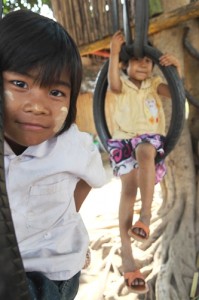 The political instability, unrest, violence, and socio-economic problems in Myanmar (Burma) have driven tens of thousands of people away from their country. Burmese, Karen, and other ethnic minorities have been fleeing their homes for refugee camps since the early 1980’s. Human rights abuses have been well documented, including execution of those who do not comply with the demands of the soldiers, forced labor, rape, and denial of the right to education. The trauma of active conflict — and the resulting loss of life, family disruption, loss of land and livelihood — has compounded this.
The political instability, unrest, violence, and socio-economic problems in Myanmar (Burma) have driven tens of thousands of people away from their country. Burmese, Karen, and other ethnic minorities have been fleeing their homes for refugee camps since the early 1980’s. Human rights abuses have been well documented, including execution of those who do not comply with the demands of the soldiers, forced labor, rape, and denial of the right to education. The trauma of active conflict — and the resulting loss of life, family disruption, loss of land and livelihood — has compounded this.
As a consequence of this enormity, children and youth have been witnesses and/or participants in traumatic events including violence and sometimes the death of their loved ones. Many youth have lost their homes, belongings, and are separated from families. They live in constant fear of further forced displacement. The children’s education has often been disrupted. Largely they remain silent, absorbing and reflecting the fear and anger of their parents, siblings, and community members – and often they do not have a way to share their personal painful experiences.
The COPE project increased the awareness of Karen educators and leaders concerning psychosocial issues and how they affect children in schools. In addition it enhanced the education system to provide a “psychosocial sensitive” environment by developing the capacity of trainers, educators and support systems to address the psychosocial needs of children and youth; developing a training of trainers curriculum; and designing a curriculum integrated into a Social Studies / Living Values curriculum for primary and secondary schools of the Karen education system in the refugee camps. The success of the program lay with the close collaboration between World Education and the Karen Education Department and the other NGOs working in education with the refugee and migrant population.
World Education successfully implemented COPE for UNICEF until the end of 2011.
